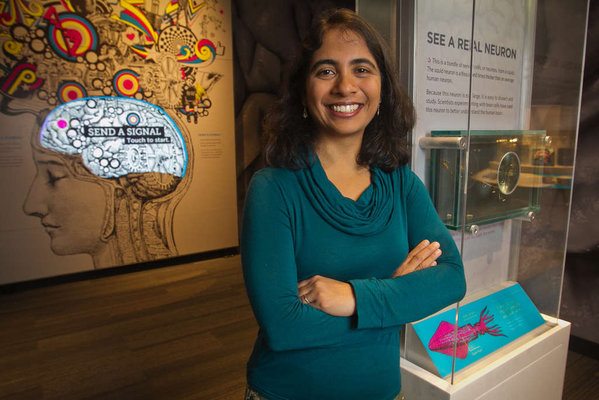By Valerie Russ
Philadelphia Daily News.
AS A YOUNGSTER growing up in King of Prussia with a fascination for science and math, Jayatri Das enjoyed spending time at the Franklin Institute. As with many Philadelphia-area students, walking through the giant heart made an impression on her.
Today, Jayatri Das, Ph.D., is chief bioscientist at the institute, where she led the team that created the museum’s largest exhibit, Your Brain, which opened last June.
Tonight, Das will be among four women scientists to be spotlighted in the fifth annual “Color of Science” program at the Franklin Institute. This year, in honor of Women’s History Month, a 6 p.m. panel discussion will feature women scientists talking about their work. Also on tonight’s panel are: Dr. Kristen A. Feemster, pediatric infectious diseases physician and health services researcher at Children’s Hospital of Philadelphia and the Perelman School of Medicine at the University of Pennsylvania.
— Agnes Chau Klucha, program manager for research and technology partnerships at UTC Aerospace Systems, in Windsor Locks, Conn.
— Carmen Fernandez-Metzler, president of PharmaCadence Analytical Services, a consulting and laboratory group, in Hatfield.
Tonight’s program is free and open to the public but requires a reservation (call 215-448-1333).
Tomorrow, the four scientists will be joined by another group scientists — four more women and two men — for the “Color of Science Laboratory,” where they will work with 300 Philadelphia school students from 9 a.m. to 3 p.m. Institute visitors will be able to view demonstrations that the scientists will do throughout the building.
Frederic Bertley, Ph.D., senior vice president of science and education at the Franklin Institute, created “Color of Science” to encourage more young people to think of science careers.
“In order for students to envision themselves in these important roles, they need to see examples of scientists and engineers that they can identify with — living and breathing role models who are relatable,” said Bertley, who holds a doctorate in immunology. For too many generations, he said, the only black scientists students learned about were from the past, such as: Dr. Charles Drew, a surgeon who developed a process for preserving blood plasma; George Washington Carver, the botanist and inventor who researched ways for farmers to improve soil by growing crops other than cotton, such as peanuts and soybeans; and Garrett Morgan, inventor of the gas mask and traffic signal.
Bertley also believes, “It’s just as important for Caucasian Americans to know just as much as African-Americans, that these people exist.”
And it is equally important for young women to learn about women scientists, he continued, because they can face obstacles pursuing careers in the sciences.
But Das said that she was lucky and had many female science teachers who encouraged her. She came to the Franklin Institute in 2006 after earning two bachelor of science degrees at Penn State and a doctorate in evolutionary biology at Princeton.
She and her team spent seven years developing Your Brain. At 8,500 square feet, it is the largest in the country devoted to the brain.
“We were inspired by the giant heart,” Das said. “We wanted to live up to people’s expectations.”
One topic she will discuss tonight is how science is important in everyday societal issues, citing, for example, what happens to the brain when a child involved in sports suffers a concussion.
Das, in her 30s, is the mother of 4-year-old twins, a boy and a girl. She said that they love playing in the Brain, “but I haven’t started quizzing them yet.”
The personal part of her life is important to note, she said, because she wants young women to know that “being a scientist is just one part of who I am.”















































































































































































































































































































































































